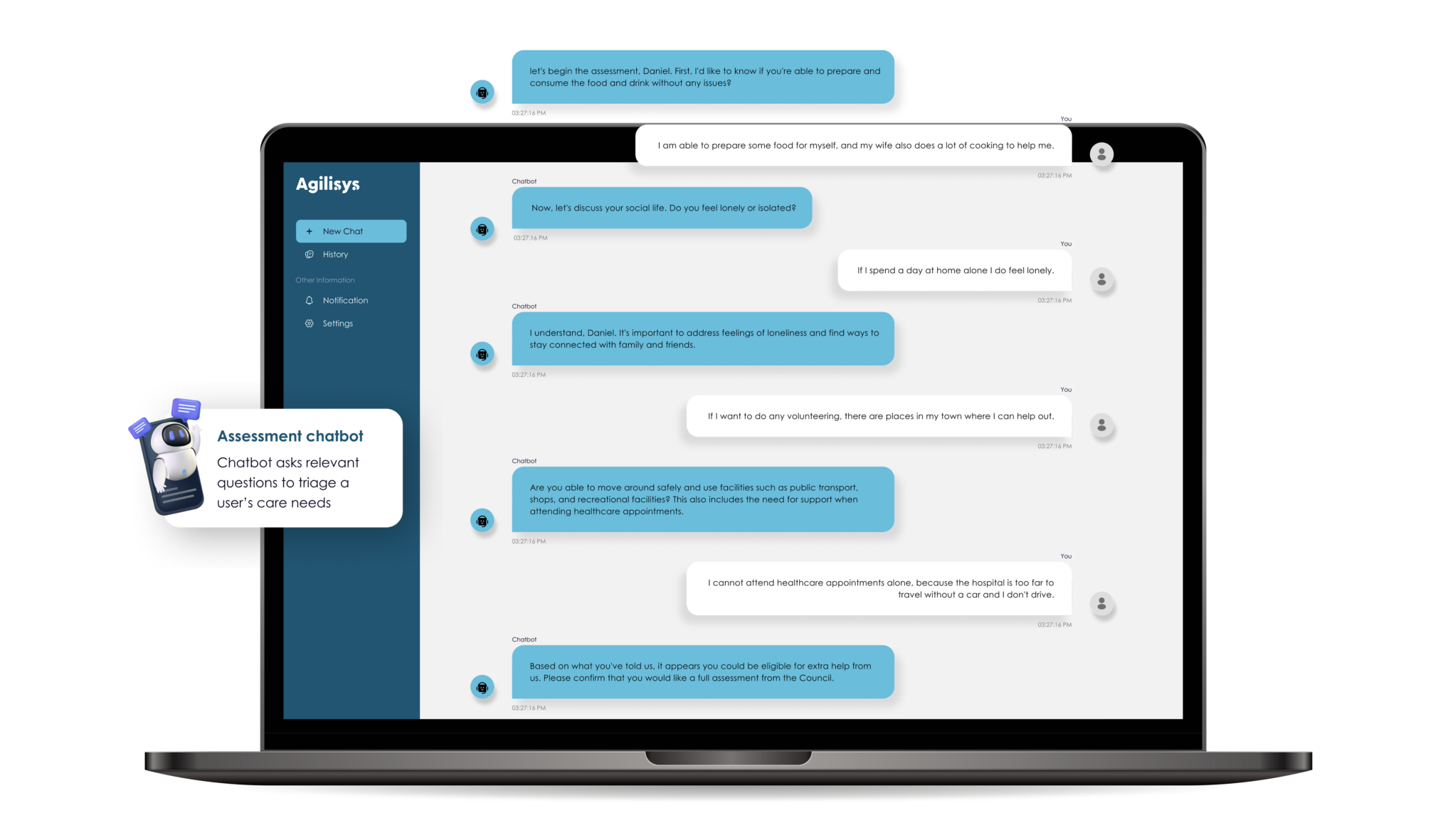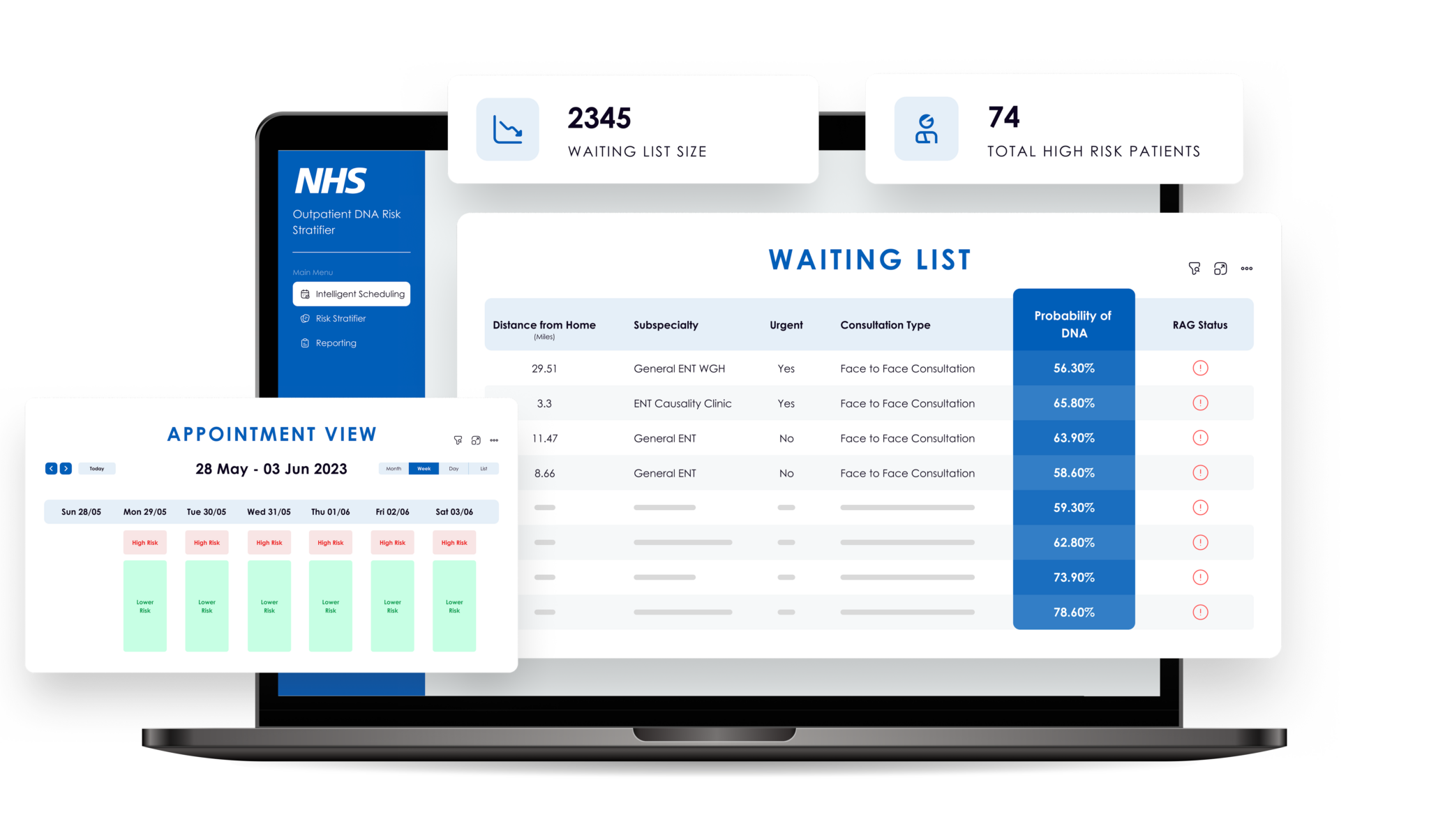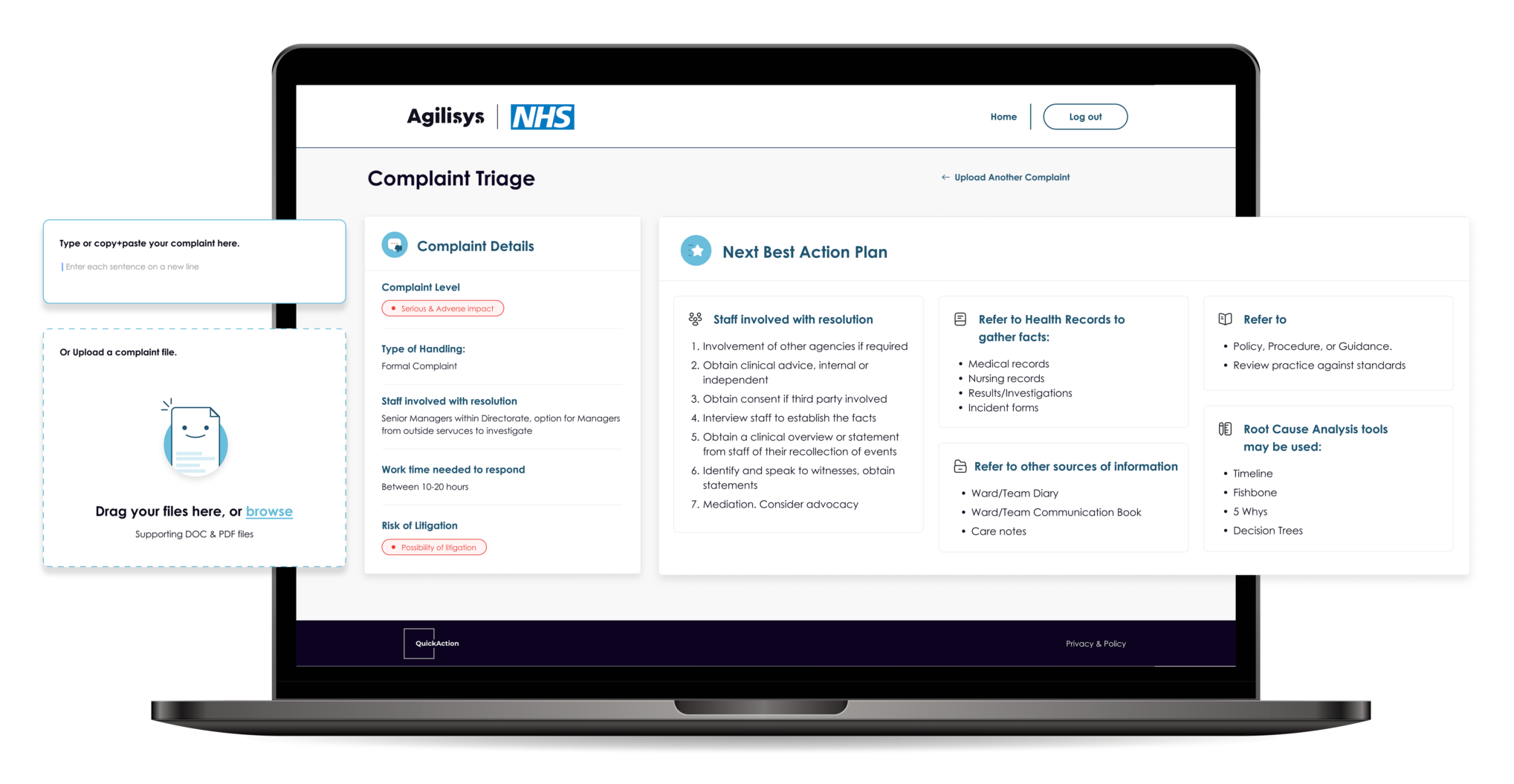
How is Generative AI set to transform the public sector?
Recently, Generative AI has emerged as a game-changing force, promising unparalleled advancements in efficiency, service delivery, and transformative change. While the private sector has been quick to harness the potential of GenAI, its applications in the public sector are equally promising. In this article, we explore examples of how GenAI is set to reshape the health and public sectors, address their unique challenges, and how its power can be harnessed to deliver customised solutions that empower citizens and drive meaningful change. From optimising social care planning to predicting patient non-attendance and streamlining the process of handling NHS complaints, GenAI holds the potential to redefine public service delivery - rendering it more efficient, effective, and centred around the citizen. Agilisys is at the forefront of this transformation as the leading innovation partner of the public sector. Our secure and robust GenAI solutions are powered by Microsoft Azure.
Social Care Planning: Easier, faster, and more effective
The rising cost of social care in the UK is driven by two main factors: increasing demand for services and increasing costs of providing them. These, combined with resource scarcity and complex, customised care solutions present material challenges for the social care sector. The time-consuming manual processes involved, such as manually taking notes and drafting support plans, consume a significant amount of social care worker’s time. As a result, around two-thirds of councils in England are overspending on social care, with 430,000 individuals awaiting assessments, care packages, direct payments, or reviews as of March 2023 [1, 2].
Working with our partners within social care, we recognized how social workers are struggling to keep pace with the demand for assessments, resulting in a backlog of requests and often delaying people in need from accessing appropriate levels of care and services they are entitled to. As a result, we have developed a toolset designed to help social care workers undertaking assessments perform their roles more effectively, resulting in a lower administrative burden, more efficient processing of information and reduced backlogs – enabling service users to access their services in a timelier fashion.
How can we support social workers by saving them time with GenAI?
The Agilisys Social Care Suite (SCS) is designed to give time back to social care workers through efficient and accurate operations powered by AI. By facilitating assessment and support planning processes, the suite significantly reduces the administrative burden on the officer, saving time by improving the efficiency of the workflow.
In practice, the tool extracts data from the case or service user record and pre-populates an assessment template, with information drawn from recorded transcripts and case notes. This approach significantly reduces the time required to draft a care plan, enabling the social worker to review and where necessary existing information, thereby preventing re-keying and saving time.
Furthermore, it enhances the initial experience for potential service users who interact with a GenAI-powered chatbot, retrieving essential information by dynamically questioning and responding. SCS ensures equitable access to social care services by providing service users with customised communications based on factors including age, language, and the individual’s relationship to the person in need of care. SCS can generate effective communications using GenAI, for example, explaining care plans to children in an age-appropriate and accessible manner. All data is securely stored, and AI models are fine-tuned within the secure Microsoft Azure OpenAI environment.
Preventing no-shows: harnessing GenAI to predict and reduce patient non-attendance in healthcare
Working with healthcare and patient-facing teams in the UK across the NHS, we have built a system which helps to predict a patient’s risk of non-attendance through DNA – “Did Not Attend” or late cancellation. In the UK, these disruptions account for 6.4% of hospital outpatient appointments, costing the NHS an estimated £1.4 billion, annually [3, 4]. Our solution optimizes resource usage and reduces the costly impact of non-attendance, ensuring healthcare resources are efficiently directed to those in need.
How can GenAI help in formulating more effective appointment management?
GenAI – integral to the Agilisys DNA Solution – revolutionises appointment management by employing a holistic approach to mitigate Did-Not-Attends (DNAs). It analyses a broad spectrum of factors, such as appointment history, demographics, geographic data, weather, and holidays, to identify patterns of non-attendance. The DNA Solution produces actionable insights, enabling administrators to take actions which will reduce the volume of DNAs in their department, ensuring lower volumes of missed appointments.
It also provides an Intelligent Scheduling System that utilises machine learning to pinpoint high-risk patients, enabling tailored booking strategies and targeted interventions. This system is powered by Microsoft’s Azure Databricks, MLFlow, and PowerBI. Additionally, the product allows healthcare providers to focus communications on those most likely to miss appointments, thus reducing the need for re-bookings and enhancing clinic efficiency.
Addressing the NHS’s time-consuming complaints handling with GenAI
In 2021-2022, the NHS received 225,570 written complaints [5]. Triaging these complaints, assigning responders, and generating responses requires substantial resources. Furthermore, making the complaint process accessible and easy to comprehend is an ongoing challenge, as is producing thematic reports that go beyond basic statistics to identify trends and patterns to senior managers and Trust decision-makers.
Our GenAI-powered solution helps to address the challenges that Trusts face in dealing with complaints and streamlines complaint management and resolution. By aligning with trust-specific policies and Health Ombudsman Complaint Standards, it ensures effective triaging, response, and reporting of complaints. This approach enhances complaint handling, provides easier access to guidance and support, and enables the identification of root causes and trends in complaints, both thematically and regionally. The efficient triaging of incoming complaints optimises response times and efforts, leading to smoother handling processes. Moreover, the solution offers comprehensive support and employs Root Cause Analysis to delve into the nuances of complaint trends and enable managers to build service improvement plans based on this data.
At Agilisys, we proudly lead the way in integrating Generative AI into the public sector. Showcasing 25 years of expertise, a network of pioneering companies, and strong partnerships with industry leaders like Microsoft, we are dedicated to delivering secure, scalable, and advanced AI solutions. By understanding the distinctive requirements of the public sector, we provide bespoke support throughout each phase of the digital transformation journey. In our vision, GenAI is a tool for empowerment, a key to enriching citizens’ lives, marking the dawn of a new era.
Talk to an expert today
To discover our diverse range of over 15 GenAI products and solutions, or to request a free demo, please provide your contact information below or contact us at info@agilisys.co.uk. We look forward to partnering with you in exploring the potential of GenAI to transform your operations and services.
References
- Room151 (2023). “ADASS: 63% of councils overspent on adult social care budgets in 2022/23, with many dipping into reserves.” Available at: https://www.room151.co.uk/151-news/adass-63-of-councils-overspent-on-adult-social-care-budgets-in-2022-23-with-many-dipping-into-reserves/.
- Community Care (2023). “60,000 cut in social care waiting lists but need continues to mount, says ADASS.” Available at: https://www.communitycare.co.uk/2023/06/21/60000-cut-in-social-care-waiting-lists-but-need-continues-to-mount-says-adass/.
- CQC (2023). “State of Care 2022/2023: Access to Care.” Available at: https://www.cqc.org.uk/publications/major-report/state-care/2022-2023/access-to-care.
- The Guardian (2018). “Patients missing their appointments cost the NHS £1bn last year.” Available at: https://www.theguardian.com/society/2018/jan/02/patients-missing-their-appointments-cost-the-nhs-1bn-last-year.
- NHS Digital (2022). “Data on Written Complaints in the NHS 2021/22.” Available at: https://digital.nhs.uk/data-and-information/publications/statistical/data-on-written-complaints-in-the-nhs/2021-22.






